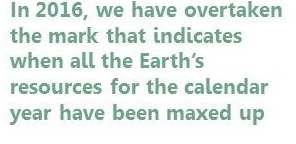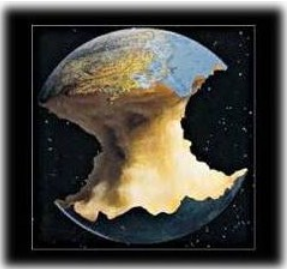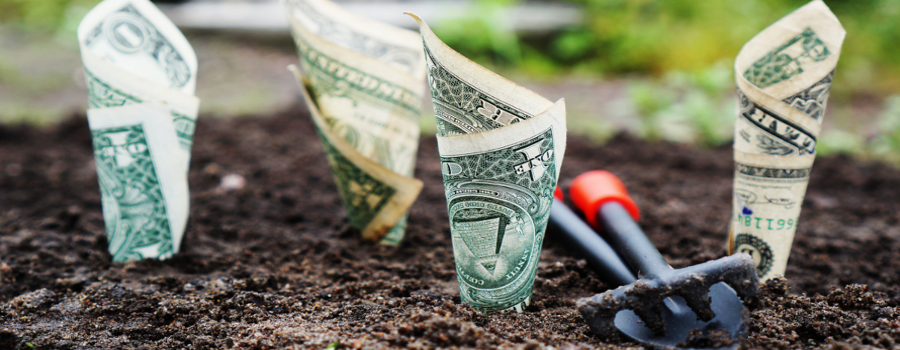August 8, 2016. 07:00h a.m. Radio turned on driving to work. Headlines begin. “Today is Earth Overshoot Day”, I hear. Oh. Bad news. The Earth Overshoot day in 2016 has been brought forward again.
I’m sure you are wondering about some things right now:
1) If I am able to understand the radio at that time in the morning,
2) Earth Overshoot day? What does it mean?
The answer to the first question is yes. I can understand if radio plays the summer song or the speech is about an environmental issue, in both cases my attention is activated immediately. And the answer to the second question is broader and deeper. I need to enlarge on this problem. Let’s see.

Earth Overshoot concept was originally developed by the New Economics Foundation (NEF) and Earth Overshoot Day is defined as a mark that indicates when humanity has maxed up all the Earth’s resources for the calendar year. Although it is only an estimation, this day is considered the best scientific approach to measure the gap between natural resources generated and destroyed annually, so that, once passed, Earth is operating in overshoot and everything consumed until the end year is supported by resources that planet cannot produce and contaminants that Earth is not able to absorb (www.footprintnetwork.org)..
The simplest example to understand the concept is thinking about Earth´s resources being money in a bank. Overshoot occurs when we withdraw money from the bank faster than to wait for the interest this money generates.
Just as a bank statement tracks income against expenditures, Global Footprint Network is the organization that analyzes thousands of data points and measures humanity’s demand for supply of natural resources and ecological services every year, that is, it compares income of the Earth (which are achieved by increasing the use of renewable energy, for example) against expenses (which are produced, among others, by massive use of private cars overconsuming fuel) and the result of the equation provides the date when humanity exhausts the nature budget for that year so for the rest months, it will maintain by drawing down local resource stocks and accumulating CO2 in the atmosphere, making climatic change worse.

Therefore it’s not a holiday definitively. Earth Overshoot day has moved from the end of October in 1993 to August 13th last year, which means that the deadline was shortened almost a week in 2016. Therefore each year the problem grows worse, if consumption patterns continue apace, it is hard to imagine that the day when we will have spent all the “credit” that exists in this Earth account could come. If we continue to destroy its natural capital and its ability to renew its environmental services, it will be very difficult to avoid it.
In CARTIF, our year already started with environmental purposes and to encourage companies for “funding” to Earth seems to us to be vital because we are in overcapacity nowadays. One of the most interesting ads to do this is the call Spanish CLIMA projects. The Spanish Ministry of Agriculture, Food and Environment (MAGRAMA) launches this call every year and encourages companies to reduce their greenhouse gas emissions with the development of new low carbon activities. It is one of the best funding for those companies that need to receive the last effort to transform their activities towards low carbon technologies, since the MAGRAMA “buys” the CO2 equivalent emissions avoided (expense to Earth eluded), raising the fixed price per tonne each year.
Thus, if you choose to carry out a more environmental process, it will be attractive from the economic point of view and besides, you will contribute to add to the “money box” of the Earth, therefore activities like changing your fossil fuel boilers by other fueled by biomass, transforming your fleet to electric vehicles or using the residual heat of your process, could make an important difference for the future.
Do you dare to bring out the environmental banker in you?
- When “green” doesn’t come from doing an LCA, but only from a Pantone® colour - 1 August 2025
- Jeff Bezos reminded me of the importance of the carbon footprint - 17 September 2021
- Creating more liveable cities using nature - 13 September 2018
